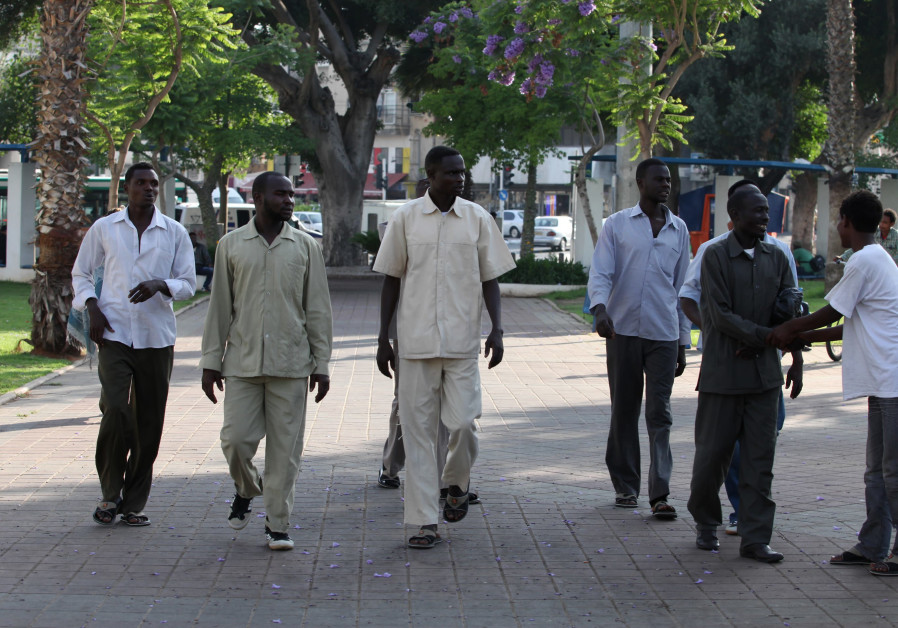Lower court: Eritrean asylum seekers can be deported to country of origin

African migrants around the Central Bus Station in Tel Aviv. (photo credit: MARC ISRAEL SELLEM/THE JERUSALEM POST)
In a thundering decision, a lower court judge specializing in African migrant issues has ruled that Eritrean asylum seekers should be deported, and slammed the High Court of Justice for thwarting past efforts.
Both sides of the migrant debate immediately started maneuvering over its significance, with pro-deportation groups claiming victory, and pro-migrant groups vowing to appeal to the higher courts criticized by the judge.
Though handed down on Tuesday, Jerusalem Special Appeals Court Judge Menachem Feshititsky’s nearly 50-page opinion, his final decision upon retirement, was only released Wednesday.
If the decision stands it would be a game-changer, as it is the first Israeli court decision saying unambiguously that the country can deport Eritreans, the largest migrant bloc in Israel, back to their country of origin after years of legal fights over the issue.
However, even Feshititsky said that his decision does not apply to the second largest bloc, Sudanese asylum seekers, or others.
Further, with Feshititsky himself pitting the ruling against the High Court, it was far from clear that his decision will be adopted in the long-term.
In a shocking departure from judicial protocol, the court even hinted support for the Knesset to pass a bill to override the High Court in order to make progress on the issue.
(function(w,d,s,i){w.ldAdInit=w.ldAdInit||[];w.ldAdInit.push({slot:10834723912266086,size:[0, 0],id:”ld-9628-9059″});if(!d.getElementById(i)){var j=d.createElement(s),p=d.getElementsByTagName(s)[0];j.async=true;j.src=”//cdn2.lockerdomecdn.com/_js/ajs.js”;j.id=i;p.parentNode.insertBefore(j,p);}})(window,document,”script”,”ld-ajs”);
Still, in the near-term there was little doubt that the Population, Immigration and Borders Authority (PIBA) would seize on the decision to try to move forward more aggressively with deportations, at least until a counter court order is issued.
Judge Feshititsky also gave migrants a small “consolation prize”, saying that if deportation still is not feasible for whatever reason, that the state should grant Eritreans permanent status in Israel, and not keep them in an indefinite limbo state.
But mostly, Feshititsky took a hardline, attacking the Eritreans as economic migrants, contending that they caused a rise in crime rates and citing the recent Eritrea-Ethiopia peace deal as a final nail in the coffin against allowing Eritreans to stay in the country.
In late July, all sides of the migrants went into overdrive trying to redefine the parameters of the issue following a peace deal between Ethiopia and Eritrea.
Eritrean protester: We are human beings, April 4, 2018 (Reuters)
Between June 5 and July 15, the two African countries traveled a remarkable road toward what appears to be a real peaceful resolution of a decades-long conflict between them.
With reports coming out on in July that Eritrea may substantially reduce its obligatory length of service for the draft from 32 years (age 18-50) to only 18 months, Israeli officials started weighing in on how that could impact the status of Eritrean migrants in Israel.
Justice Minister Ayelet Shaked and Knesset Interior Committee Chairman Yoav Kisch said that once Eritrea has eliminated or reduced its draft, that all Eritreans currently in Israel should be sent back to Eritrea.
Since the mid-2000s, there has been a battle in Israel between pro and anti-migrant groups about whether tens of thousands of Africans, mostly from Eritrea and Sudan, should get to stay as refugees or should be sent back to their countries of origin or third countries as migrant workers.
A primary fault-line of the debate has been that pro-migrant groups, including the UN, have said Eritreans cannot be sent back to Eritrea.
The main argument has been that the country’s obligatory draft leads to life-long persecution and sometimes torture or death at the hands of their own Eritrean commanders.
Under international law this could allow the Eritreans to stay in Israel even though they almost all crossed into the country illegally from Egypt before Israel built a border wall ending the flow of new migrants.
Shaked, Kisch, and, as of Wednesday, Judge Feshititsky, are arguing that peace and eliminating or reducing the draft means that there is no longer any reason that Eritreans cannot be sent back.
In contrast, a spokeswoman for the Hotline for Refugees and Migrants told The Jerusalem Post that the peace deal, a reduction in the draft and a readiness of Eritrea to accept back its citizens who fled to escape the draft, without persecution, are still very uncertain.
Government representatives of multiple ministries addressing the issue in July at the Knesset Interior Committee said they would need to verify that returning any Eritreans would not endanger their personal security, leaving the issue still up in the air.






Comments are closed.